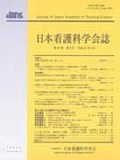Japanese
English
- 販売していません
- Abstract 文献概要
- 参考文献 Reference
要旨
目的:看護学生の対人関係場面における認知のゆがみのパターンとストレス反応との関係性について検討した.
方法:看護学生307名を対象として,対人関係場面の認知のゆがみとストレス反応を調べるための調査を実施し,両者の関連性について分析した.
結果:認知のゆがみ得点に基づくクラスター分析の結果,認知のゆがみのタイプは,ゆがみ低群,ゆがみ高群,仲間拒否群,謙遜群の4群に分類された.各群のストレス反応は,ゆがみ低群は他群と比較して低く,ゆがみ高群は他群と比較して高かった.また,仲間拒否群は,謙遜群と比較して情動的ストレス反応が高かった.
結論:対人関係場面での認知のゆがみが全般的に強い学生や回避的な認知傾向がある学生では,心理的ストレス反応が高くなることが示唆された.この結果は,看護学生のストレスマネジメントにおいて,認知再構成法のような認知行動的な技法を取り入れることの重要性を示している.
Abstract
Purpose: The relationship between cognitive distortions in interpersonal situations and the stress responses of nursing students was investigated.
Methods: Nursing students(n=307)completed the Cognitive Distortion Scale and the Stress Response Scale. They were divided into four groups based on the results of cluster analyzing Cognitive Distortion Scale scores: "Low distortion," "High distortion," "Refusing friends," and "Modest."
Results: The total stress score of the Low distortion group was significantly lower in comparison to the other groups, whereas, the High distortion group had the highest stress responses. Moreover, the Refusing friends group showed more negative emotional responses than the Modest group.
Conclusion: Nursing students with tendencies for Cognitive distortions and Cognitive avoidance in interpersonal relationships are under higher stress. Therefore, the important including cognitive-behavioral methods such as cognitive restructuring in the stress management programs for nursing students are suggested.
Copyright © 2013, Japan Academy of Nursing Science. All rights reserved.


